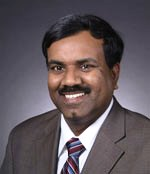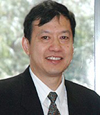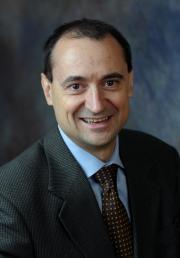Genomes Galore: Big Data Challenges in the Life Sciences
Srinivas Aluru
Professor, School of Computational Science and Engineering
Co-Executive Director, Institute for Data Engineering and Science
Georgia Institute of Technology

Genomes Galore: Big Data Challenges in the Life Sciences, Srinivas Aluru Srinivas Aluru Professor, School of Computational Science and Engineering
Depei Qian Professor, Sun Yat-sen University and Beihang University ,
Josep Torrellas Saburo Muroga Professor of Computer Science,
China’s HPC development in the next 5 years, Depei Qian
Toward Extreme-Scale Processor Chips, Josep Torrellas
Genomes Galore: Big Data Challenges in the Life Sciences
Co-Executive Director, Institute for Data Engineering and Science
Georgia Institute of Technology
Abstract
While the big data revolution in the consumer, business, and social networks domains is widely known, a similar revolution is taking place in the sciences and engineering driven by high-throughput instrumentation. This talk will feature big data challenges in the life sciences, primarily due to advances in sequencing that resulted in several orders of magnitude throughput increases per unit cost during the last decade. These advances are democratizing big data generation capabilities and spawning new scientific inquiries that would not be feasible otherwise. The time, cost, and complexity of data analysis have overtaken the cost and speed of data generation as the primary bottlenecks, posing significant challenges for computer scientists. I will present an overview of my group’s research in addressing some of these issues through the development of parallel algorithms and high performance computing approaches. Apart from opening new avenues of investigation in parallel processing, research in this domain is also leading to broadly applicable techniques in areas such as graph analytics and parallel machine learning. I will also brief the audience on the ongoing federal initiatives in the United States aimed at nurturing multi-stakeholder partnerships to advance such big data challenges.
Bio
Srinivas Aluru is a professor in the School of Computational Science and Engineering at Georgia Institute of Technology. He co-directs the Georgia Tech Interdisciplinary Research Institute in Data Engineering and Science (IDEaS), and co-leads the NSF South Big Data Regional Innovation Hub which serves 16 Southern States in the U.S. and Washington D.C. Earlier, he held faculty positions at Iowa State University, Indian Institute of Technology Bombay, New Mexico State University, and Syracuse University. Aluru conducts research in high performance computing, bioinformatics and systems biology, combinatorial scientific computing, and applied algorithms. He is currently serving as the Chair of the ACM Special Interest Group on Bioinformatics, Computational Biology and Biomedical Informatics (SIGBIO). He is a recipient of the NSF Career award, IBM faculty award, Swarnajayanti Fellowship from the Government of India, and the Outstanding Senior Faculty Research award and the Dean’s award for faculty excellence at Georgia Tech. He received the IEEE Computer Society meritorious service award, and is a Fellow of the AAAS and IEEE.
China’s HPC development in the next 5 years
Dean of the School of Data and Computer Science, Sun Yat-sen University
Abstract
After a brief review of HPC research and development in China’s high-tech R&D program, this talk will introduce the plan of HPC development under the new Key R&D Program of China in the thirteenth 5-year plan. The major challenges in establishing the eco-system for high performance computing in China will be discussed, including the technical issues in developing the next generation high performance computers, the need for developing system/application software for the systems based on domestically developed processors, and the mechanism for establishing a sustainable national HPC environment. The goal and the major activities of the new key project on HPC will be presented.
Bio
Depei Qian is currently a professor at Sun Yat-sen University and Beihang University and serves as Dean of the School of Data and Computer Science at Sun Yat-sen University. He has been working on computer architecture and computer networks for many years. His current research interests include high performance computer architecture and implementation technologies, distributed computing, network management and network performance measurement. He has published over 300 papers in journals and conferences. Since 1996, he has been a member of the expert group and expert committee of the National High-tech Research and Development Program (the 863 program) in information technology. He has been chief scientist of three 863 key projects on high performance computing since 2002. Currently, he is the chief scientist of the 863 key project on high productivity computer and application service environment.
Toward Extreme-Scale Processor Chips
University of Illinois Urbana-Champaign
Abstract
As transistor sizes continue to scale, we are about to witness stunning levels of chip integration, with 1,000 cores on a single die, and increasing levels of die stacking. Transistors may not be much faster, but there will be many more of them. In these architectures, efficient communication and synchronization will be a challenge. Moreover, energy and power will constrain the designs even more than they do today. In this context, this talk presents some of the technologies that we may need to deploy to exploit these architectures. To enable data sharing, we need novel synchronization and fence hardware. For low-latency communication, we may leverage on-chip wireless networks. Cores need to be voltage scalable, i.e., flexibly operate both at high and low voltage ranges. Techniques for efficient energy use need to be widespread. Finally, hardware extensions to ease programming will provide a competitive edge. A combination of all of these techniques --and more-- are needed.
Bio
Josep Torrellas is the Saburo Muroga Professor of Computer Science at the University of Illinois at Urbana-Champaign. He is a Fellow of IEEE and ACM. He is the Director of the Center for Programmable Extreme-Scale Computing, a center focused on architectures for extreme energy and power efficiency. He was until recently the Director of the Intel-Illinois Parallelism Center (I2PC), a center created by Intel to advance parallel computing. He has made contributions to parallel computer architecture in the areas of shared memory multiprocessor organizations, cache hierarchies and coherence protocols, thread-level speculation, and hardware and software reliability. He received the 2015 IEEE CS Technical Achievement Award.